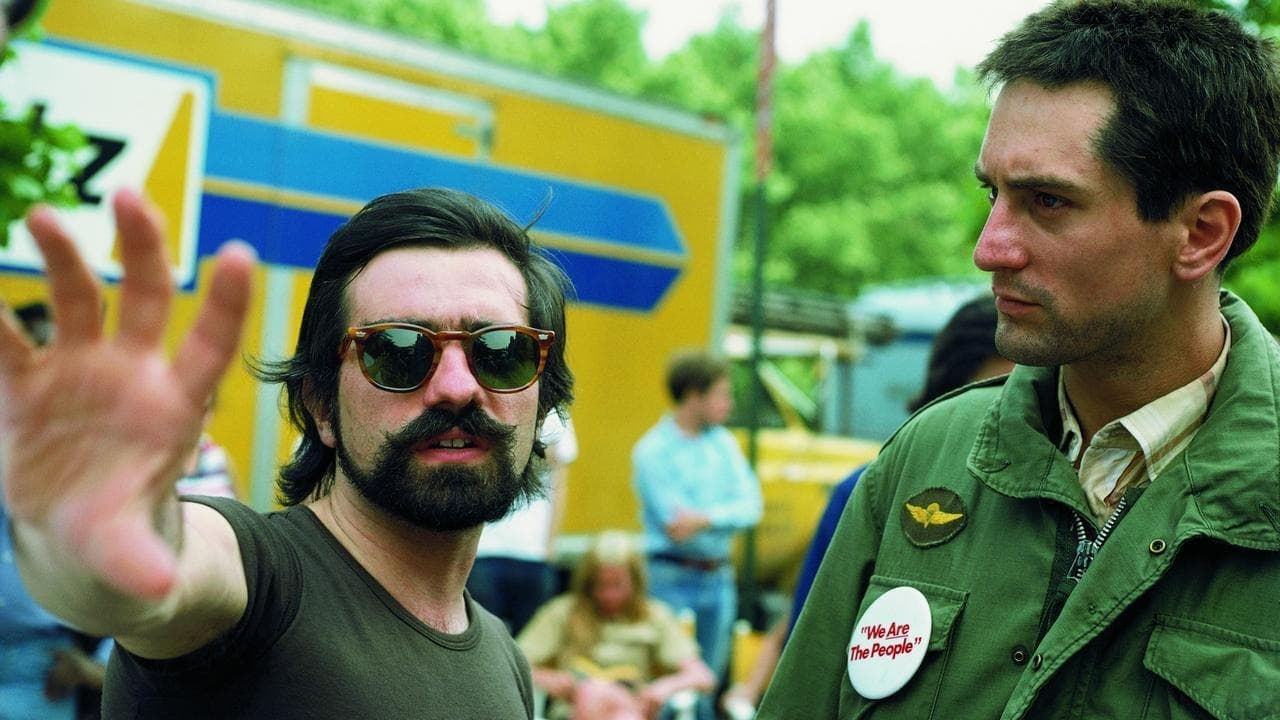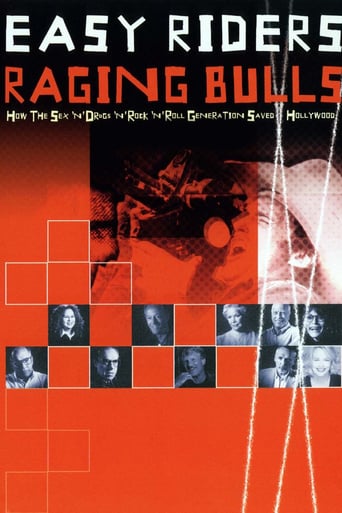Solidrariol
Am I Missing Something?
Janae Milner
Easily the biggest piece of Right wing non sense propaganda I ever saw.
Bessie Smyth
Great story, amazing characters, superb action, enthralling cinematography. Yes, this is something I am glad I spent money on.
Ariella Broughton
It is neither dumb nor smart enough to be fun, and spends way too much time with its boring human characters.
Dhawal Trivedi
revolution of films from the mid'60s-late'70s... in the mid 60's, during the peak of European cinema (with directors like- Bergman, Fellini, Godard, Truffaut) Hollywood was on a downhill loosing its artistic touch. big studios wanted to make same old movies and film audiences wanted more realistic cinema.. after redemption of old studios, then came a new wave of young filmmakers who defined the Hollywood now. martin Scorsese, Francis ford Coppola, Steven Spielberg, peter Bogdanovich, Hal Ashby, Dennis hopper, warren Beatty, were practically just movie-nerds who wanted to talk about films all day and make them... and of course sex,drugs, rock n roll culture played a big part in this evolution too. movies like bonnie and Clyde, easy rider, the godfather, taxi driver, mean streets.its a great documentary about, how few trend setting directors took control of film/Hollywood from studio-centralized oriented films, in their own hands. also early days of jack Nicholson and Robert De niro. but once in 70's, these directors made blockbusters like godfather, jaws, star wars... studios figured out the way to make big money and now its all about just "big-budget-B-grade movies"filmmakers in 60's were- you don't know how to make a film, i do, so let me do it ! and finally after 10 years studios were able to say- yes we do know how to make money, and u will make it for us !
jpschapira
There was a great and truly improving decade for Hollywood; the 70's. Many think, and I probably agree, that the best cinematographic decade took place in the nineties, but, even if we want it or not, the directors of the nineties started making films in the 70's. Kenneth Browser's documentary, narrated by William H. Macy, tells how these directors emerged."The secret of making a film is just saying that you'll make it", said in his twenties a director the documentary refers to as "the man who would be king". That's Francis Ford Coppola, who made movies even if the studios didn't want him to. His is one of the many stories we meet, but we doesn't meet him; he doesn't talk in the documentary. We know "The Godfather" was seen by many people, but Coppola doesn't tell us that.Peter Bogdanovich does tell his story. His wife talks, about when they were filming "The last picture show", and about the close relationship he had with Cybill Shepherd, probably an affair. He was one of the various directors who were more important than the studio and producers. When a director could do things right, he got authority. William Friedkin, who made two successes in a row, gained authority too.You can't say much about the documentary. It is good, it tells its story correctly, but the thing is that there are no actors, no choreography; everything is real. And we believe Dennis Hopper when he says he was stoned as he shot "Easy Rider", and we believe Kris Kristofferson when he says Sam Peckinpah went down too many times, we believe Julia Phillips when she says she was bad.I came to find out what they call now B-Movies, like "Jaws", the first movie to make 100 million in the box office. Then a bunch of B-Movies came, just with the objective of winning money. The thing is, they were greatly done in some cases, by A-Directors, if you get what I mean. Steven Spielberg was a kid, and made his TV film "Duel", and started improving technology…You know what came later on. So, when Coppola's apprentice George Lucas showed a raw version of "Star Wars" to the industry, and no one liked it, Spielberg said: "You're going to make millions". You know what happened.We meet many more also. There's Arthur Penn, and therefore how good was Warren Beatty with his money and his way of controlling directors. There's Robert Altman, who could be the only star in one of his films, which caused him many problems, and successful films between 20-years periods. There's Roman Polanski, who's considered a fugitive, but lost his wife in the States, because of his uncontrolled life. She had a baby inside. Then he made, in his own vision, "Chinatown", starred by another influential actor, Jack Nicholson.Richard Dreyfuss talks, so does Peter Fonda. Jonathan Tapin says he got money to produce a film, from a not influential director, which starred his friends and dedicate and passionate actors; Robert De Niro and Harvey Keitel. This movie was "Mean Streets". During a showing an important producer left his seat and Tapin: "Oh, he doesn't likes it, he's leaving". Then this producer got near Tapin's seat, and said to him: "This is the best film I've seen this year, but I have to go to the bathroom; can you stop it?" Paul Schrader tells the camera about his period of loneliness, when he was going nowhere, and although not as affected by drugs and alcohol as the rest, he took a rest. He was one of the "nerd" guys, as they described them. When everybody when to the Phillips' house to get high, Spielberg, Schrader and Coppola where guys that enjoyed chatting about movies. So it occurred to Schrader the idea about the taxi driver. So when he wrote his next script, he couldn't find a director. "Direct it yourself", his friends told him. But for some reason, that special director of "Mean Streets", who was always willing to do the original, and that actor who had already won an Oscar for "The Godfather", were the people for the project.This is how Robert De Niro and the director I haven't said the name (you know who he is) teamed up again for "Taxi Driver". Coincidentally, after the 70's ended, all the other pioneers were steady and that passionate director Marty Scorsese wanted to quit his career, encouraged by Bob De Niro, he have one last shout. This is when we see one scene from "Raging Bull", and the beginning of another history, that is the 80's.
jerk1483
This docu makes the misguided error of comparing the careers of Hal Ashby and Steven Spielberg. More different film-makers there have never been. However, by sheer virtue of sharing artistic or commercial success in Hollywood in the same decade, these two anomylous inclusions are lumped in together. Peter Bogdanovich regales us simpletons with his self-encyclopedia, as if he were ever more than a journey-man director. It's intriguing to see the commercial success of The Exorcist and the critical success of Mean Streets sharing the same five minute discussion with various Hollywood talking heads all of whom are past their prime.One of the rare gems of the film is the sequence recalling how Martin Scorcese, Paul Schrader, George Lucas, Spielberg and many other prominent male film-makers would hang out in the same beach houses in Malibu, but it's only ten minutes long. This is a film obsessed with the tangential perks of that divine spark that was the 70's renaissance of American movies. Presumably this film is based on a best-selling book of the same name, but all this film can sum up is that a bunch of cool movies came out in the 70's, and that, YES, the men who made those movies hung out from time to time. Honestly, you'd be better off just watching every film by the directors that this film interviews and save yourself the thankless task of listening to too many Hollywood has-beens pine for yesteryear. What really happened to these people's careers? Drugs for some, ego for others. Spotty at best, this film just isn't all it could be. 3/10
rmc65
This is a great look at Hollywood in the 1960's and 1970's. If you hadn't already noticed, that was an era of great American films, and "Easy Riders, Raging Bulls" tells you how and why. The interviews and narration are awesome, and I love seeing all those old movie posters and clips. There may be a few independent filmmakers missing from this piece, but it's impossible to cover them all in just 2 hours. Plus, the thesis of this film deals with the major studios and how talented YOUNG artists briefly took control and made cool movies with studio money. I only wish the industry was like that today.

